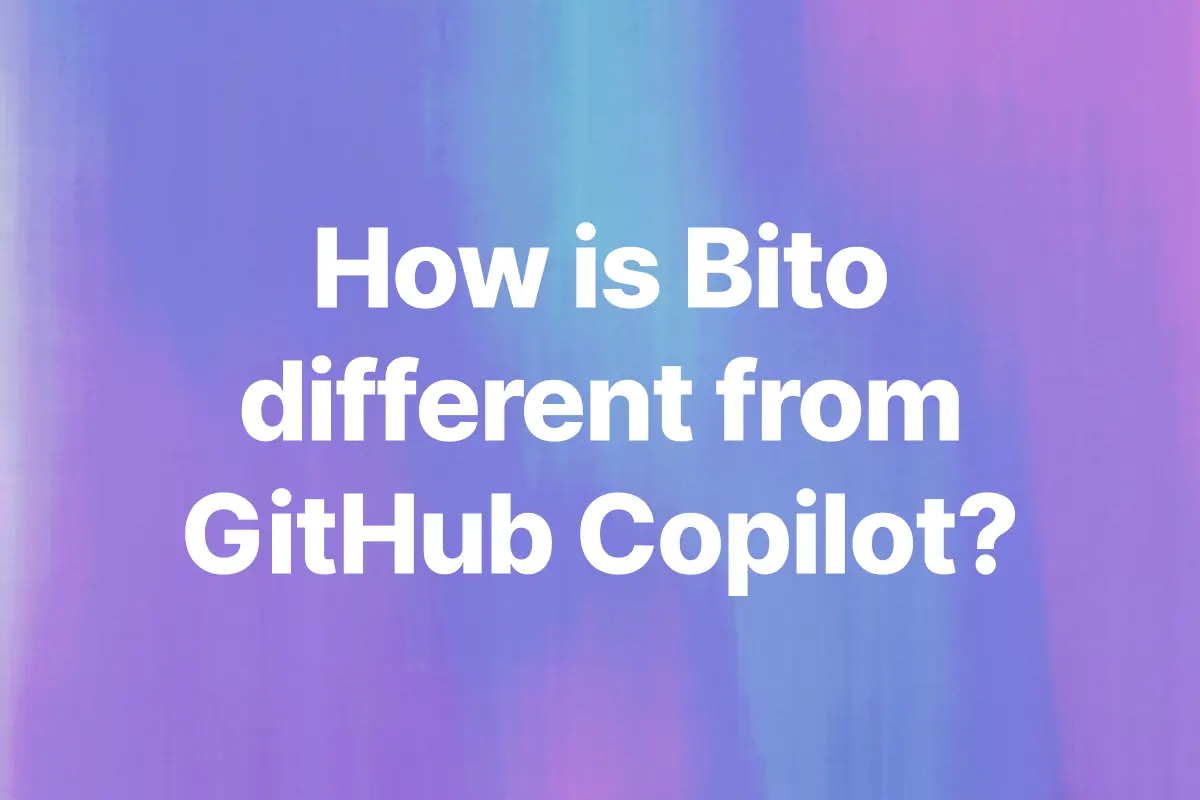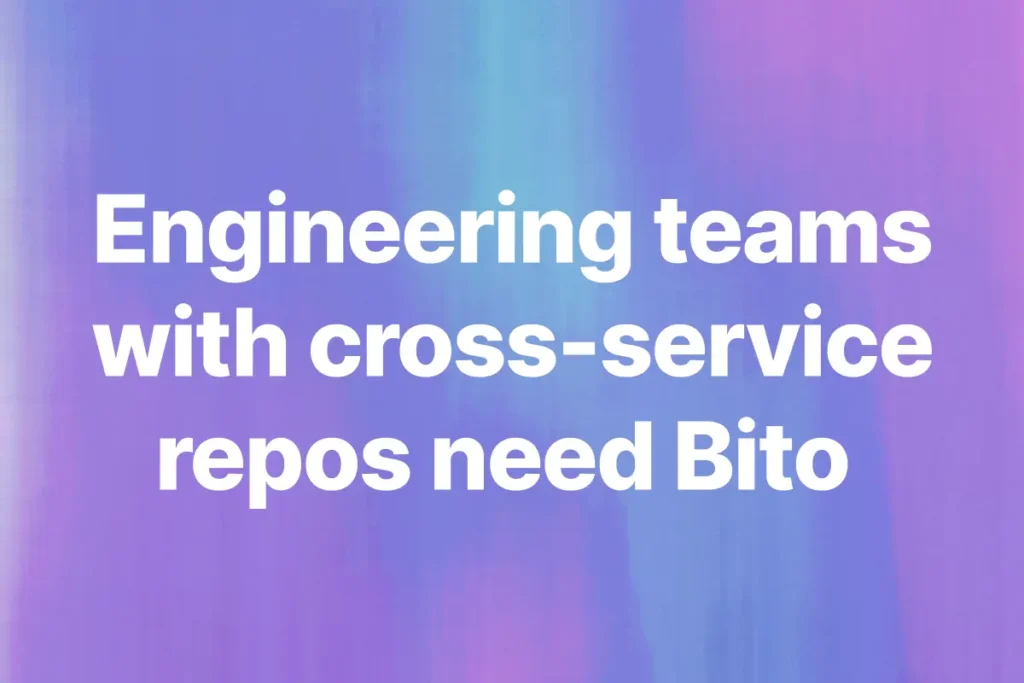We have a comparison page that talks about Bito vs GitHub Copilot. Still, one of the most common questions we get on customer calls is: How is Bito different from GitHub Copilot?
The assumption is that both tools solve the same problem, just in different ways. And in this case, that assumption is mostly fair. Both tools show up inside your pull request and leave AI-generated feedback.
But once we put them side by side, the differences showed up fast.
This blog is based on benchmarking data across 65 known issues, tested in real codebases and multiple languages. It covers what each tool does, how they’re different, and where one goes further than the other.
If you’re trying to understand which one fits your workflow, this is the comparison that counts.
Benchmarking methodology: How we measured
Throughout this blog, we’ll refer to a benchmarking report based on a truth set of 65 known issues. These issues were chosen to reflect common developer mistakes, security risks, logic bugs, and anti-patterns.
Each tool was tested on the exact same code across multiple languages: TypeScript, Python, JavaScript, Go, and Java. All code was pushed through pull requests. We did not tweak or tailor the examples to any tool.
The issues were split into two categories:
- General issues: things like unused variables, missing checks, repetitive logic
- High-severity issues: production-impacting bugs, security flaws, and major regressions
Both tools were run on the same setup, with default review settings enabled.
Benchmarking comparison report: Bito vs Copilot
Here’s what we saw across the full 65-issue set.
| Language | Bito Found Issues | Copilot Found Issues |
| TypeScript | 49/65 | 14/65 |
| Python | 46/65 | 12/65 |
| JavaScript | 43/65 | 16/65 |
| Go | 41/65 | NA |
| Java | 45/65 | 8/65 |
Bito consistently found over 65% of issues across languages. Copilot stayed below 25%. In short, Bito found 3.5 times more issues overall.
Then we looked only at the 25 high-severity issues. These are the ones that matter most.
- Bito found 22 out of 25
- Copilot found 8 out of 25
That’s a 2.75 times improvement on critical issue detection.
Read the whole benchmarking report in detail: Benchmarking AI Code Reviews.
Detailed comparison between Bito and Copilot
I just showed you a practical comparison between both tools. Now, let me talk about some theoretical concepts. Differences between Bito and GitHub copilot AI reviews based on:
1/ Architectural differences
Bito and Copilot take fundamentally different approaches to code review. Copilot gives quick feedback on visible diffs. Bito runs a multi-stage analysis that inspects structure, intent, and dependencies.
Bito:
- Uses ASTs to understand code structure and logic
- Tracks variables, functions, and classes across files using symbol indexing
- Applies semantic embeddings to detect patterns and logic flaws
- Supports Essential and Comprehensive review modes
- Performs incremental reviews that comment only on new changes
Copilot Code Review:
- Primarily analyzes code based on open files rather than entire codebase
- Copilot may not identify all of the problems that are present in code, especially where changes are large or complex. Source: GitHub docs
- No configurable depth or incremental review support
2/ Feature comparison
Beyond how each tool works, the features they offer to developers and reviewers are very different.
Bito includes tools to speed up triage, reduce context switching, and provide structured feedback. Copilot’s features are limited to high-level summaries and occasional comments.
Bito:
- Pull request summary: Generates a short summary of what changed and what the PR is about.
- Changelist view: Adds a clear table to the PR that shows what files changed and what parts of the system are affected.
- Line-level suggestions: Leaves inline comments with specific code changes and allows reviewers to accept them in one click.
- Static analysis and linting: Built-in support for Mypy, Facebook Infer, ESLint, Ruff, and golangci-lint.
- Custom review rules: Teams can define guidelines or let Bito create new rules automatically based on repeated feedback.
- Language support: Supports all major programming languages.
Learn more here.
Copilot Code Review
- Code review comments: Copilot only leaves comments, not approvals or change requests. So, it doesn’t count toward approvals and won’t block merges.
- GitHub-native UI: Works inside the GitHub pull request view with no setup required. You only need to select
- Language support: As of May 2025, it supports all major programming languages.
3/ Platform support
Bito is built for teams that use multiple version control systems. Copilot works only on GitHub.
Bito:
- Supports GitHub cloud and GitHub Enterprise (self-hosted)
- Works with GitLab cloud and GitLab self-hosted
- Supports Bitbucket cloud (and recently launched Bitbucket self-hosted)
Copilot Code Review:
- Only works on GitHub (and VS Code)
- No support for GitLab, Bitbucket
4/ Toolchain integration
Bito connects to external tools across project management, static analysis, and security. Copilot does not offer these connections natively.
Bito:
- Integrates with Jira, Confluence, and Linear
- Runs static analysis with ESLint, Ruff, Mypy, golangci-lint, and Facebook Infer
- Scans for secrets and vulnerabilities with Snyk, Whispers, detect-secrets, and OWASP Dependency-Check
Copilot Code Review:
- Only integrates within the GitHub environment
- Third-party extensions exist but require manual setup
5/ Customization and learning
Most review tools give the same feedback to every team. Bito lets you define how reviews should work based on your own guidelines. It also improves over time by learning from reviewer feedback. Copilot doesn’t do either.
Bito:
- Teams can create custom code review rules to match internal standards. This includes naming conventions, folder structure, logic patterns, and more.
- Rules can be scoped at the repo level or shared across teams. Multiple agents can be configured for different review styles.
- When a reviewer marks the same suggestion as unhelpful multiple times, Bito stops surfacing it. After enough repeated patterns, it auto-generates a rule to avoid that issue.
- Feedback is tracked over time, so the review becomes more aligned with team expectations.
Copilot Code Review:
- Offers static coding guidelines on enterprise plans. These are manually defined and do not adapt. More here.
- All suggestions remain fixed regardless of reviewer feedback.
- Rules apply globally and cannot be customized per repo.
How each tool analyses code
Copilot runs a quick review on the pull request diff. It looks at what changed, generates a short summary, and adds a few comments. But the analysis is limited to the visible diff.
It doesn’t evaluate related files, track references, or understand how the change affects the rest of the codebase. The only biggest upside of Copilot is that it is GitHub native.
Bito runs a deeper review. It parses the code using abstract syntax trees and builds a full map of the change. It tracks symbols and usage across files.
It applies over 90 checks, including static analysis, security scanning, and logic evaluation. It uses embeddings to detect semantic issues that aren’t obvious from syntax alone.
Conclusion
The above mentioned is the main difference. Copilot gives you feedback on the diff, only in GitHub. Bito offers codebase aware reviews in GitHub, Gitlab, and Bitbucket. It tries to understand the actual impact of the change.
Interested more? Read our other blogs on GitHub Copilot alternatives and best AI code review tools.






